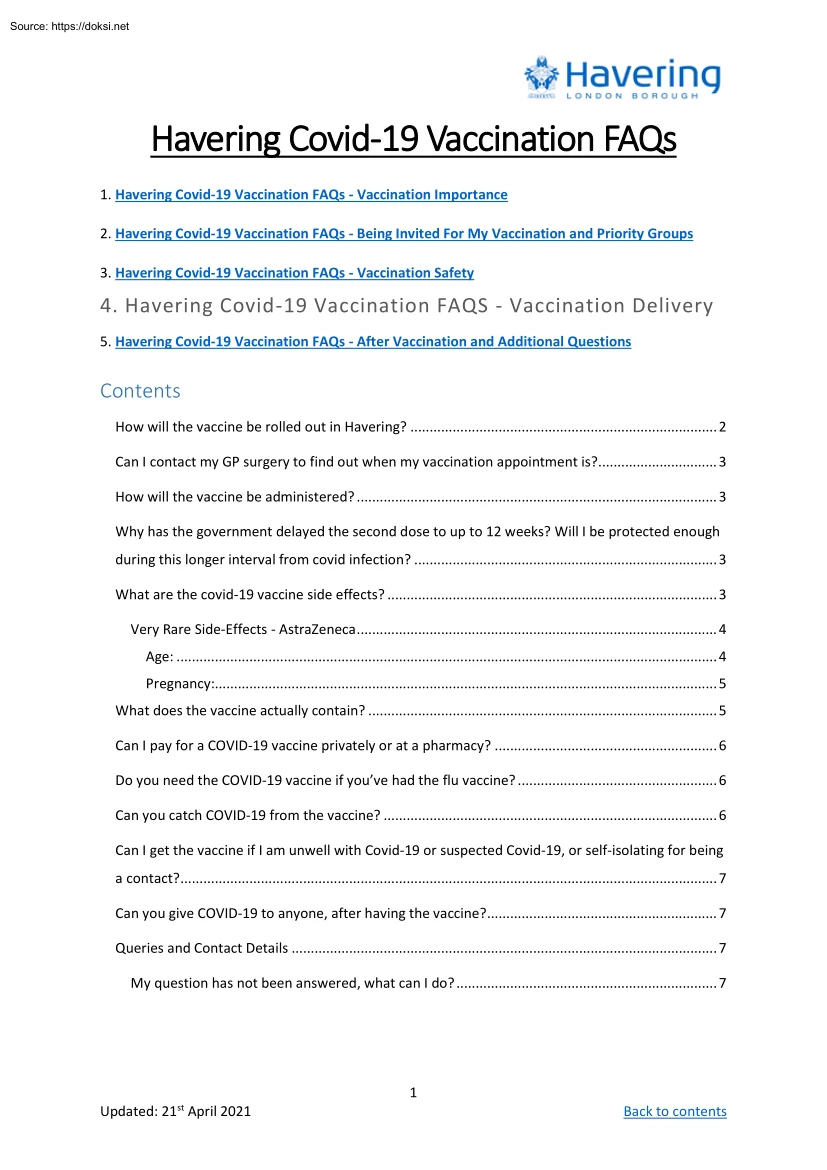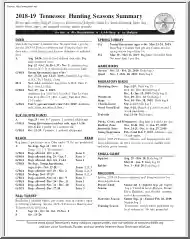Please log in to read this in our online viewer!

Please log in to read this in our online viewer!
No comments yet. You can be the first!
What did others read after this?
Content extract
Havering Covid-19 Vaccination FAQs 1. Havering Covid-19 Vaccination FAQs - Vaccination Importance 2. Havering Covid-19 Vaccination FAQs - Being Invited For My Vaccination and Priority Groups 3. Havering Covid-19 Vaccination FAQs - Vaccination Safety 4. Havering Covid-19 Vaccination FAQS - Vaccination Delivery 5. Havering Covid-19 Vaccination FAQs - After Vaccination and Additional Questions Contents How will the vaccine be rolled out in Havering? . 2 Can I contact my GP surgery to find out when my vaccination appointment is?. 3 How will the vaccine be administered? . 3 Why has the government delayed the second dose to up to 12 weeks? Will I be protected enough during this longer interval from covid infection? . 3 What are the covid-19 vaccine side effects? . 3 Very Rare Side-Effects - AstraZeneca . 4 Age: . 4 Pregnancy:. 5 What does the vaccine actually contain? . 5 Can I pay for a COVID-19 vaccine privately or at a pharmacy? . 6 Do you need the COVID-19 vaccine if you’ve had the
flu vaccine? . 6 Can you catch COVID-19 from the vaccine? . 6 Can I get the vaccine if I am unwell with Covid-19 or suspected Covid-19, or self-isolating for being a contact?. 7 Can you give COVID-19 to anyone, after having the vaccine?. 7 Queries and Contact Details . 7 My question has not been answered, what can I do? . 7 1 Updated: 21st April 2021 Back to contents How will the vaccine be rolled out in Havering? The vaccination delivery is currently being led by the NHS with the support from Local Government. If you are a resident or a member of staff and you are among the eligible priority group, you will receive a letter from the NHS. You can then book to receive the vaccine at one of the local sites below or other sites offered by the NHS e.g, ExCeL centre Queens Hospital Vaccine Hub Raphael House Liberty Shopping Centre Primary Care Vaccine Hub (Hornchurch Library) If the picture is unclear, please click on the picture to go to the webpage.
Alternatively, click here: https://www.eastlondonhcpnhsuk/downloads/Map-of-north-east-London-Covid-vaccinecentrespdf 2 Updated: 21st April 2021 Back to contents Can I contact my GP surgery to find out when my vaccination appointment is? We are asking people not to contact their GP or local hospital to find out about their appointment unless they are in cohorts 1-9 and they have not yet received an invitation. Everyone will be invited and given the information at the right time. The NHS is under immense pressure so we strongly encourage individuals to wait for their name to be called. How will the vaccine be administered? The vaccines are given as an injection into the muscle in your upper arm. Both vaccines are given as 2 doses, between 21 days (Pfizer) or 28 days (Oxford & Moderna) and 12 weeks apart. You will be monitored by a healthcare professional for a minimum of 15 minutes after the first dose if required. Why has the government delayed the second dose to up to 12
weeks? Will I be protected enough during this longer interval from covid infection? The UK Chief Medical Officers have agreed a longer timeframe between first and second doses so that more people can get their first dose quickly, and because the evidence shows that one dose still offers a high level of protection after two weeks. This decision will allow us to get the maximum benefit for the most people in the shortest possible time and will help save lives. Getting both doses remains important so we would urge people to return for it at the right time. What are the covid-19 vaccine side effects? Like all medicines, vaccines can cause side effects. Unlike the disease, most of these effects are mild and short-term, and not everyone gets them. Even if you do have symptoms after the first dose, you still need to have the second dose. Very common side effects include: • Having a painful, heavy feeling and tenderness in the arm where you had your injection. This tends to be worst around
1 to 2 days after the vaccine • Feeling tired • Headache • General aches, or mild flu like symptoms 3 Updated: 21st April 2021 Back to contents Although feeling feverish is not uncommon for 2 to 3 days, a high temperature is unusual and may need to consult with your GP. You can rest and take the normal dose of paracetamol (follow the advice in the packaging) to help make you feel better. These symptoms normally last less than a week. If your symptoms seem to get worse or if you are concerned, call NHS 111 or your GP. If you do seek advice from a doctor or nurse, make sure you tell them about your vaccination (show them the vaccination card) so that they can assess you properly. You can also report suspected side effects of vaccines and medicines online through the Yellow Card scheme or by downloading the Yellow Card app. Very Rare Side-Effects - AstraZeneca Age: Based on the emerging evidence of extremely rare thrombosis/thrombocytopenia events, the guidance and
recommendations have changed. Please note that these guidelines have changed as a precautionary measure. The JCVI chairman Professor Wei Shen Lim said: "We are advising a preference of one vaccine over another vaccine for a particular age group out of utmost caution rather than any serious safety concerns." There have been reports of an extremely rare adverse event of concurrent thrombosis (blood clots) and thrombocytopenia (low platelet count) following vaccination with the first dose of AstraZeneca vaccine. 79 in 20 million people have experienced this extremely rare adverse event The Medicines and Healthcare Products Regulatory Agency (MHRA) concluded there is a possible link between the Oxford vaccine and "extremely rare and unlikely to occur" blood clots with lowered platelets. “The risk is four people in a million," Dr Raine added This would be 0004 people in 1000. To put this into context, when taking paracetamol, among the rare side effects reported,
clotting disorders may affect 1 in 1000. The numbers of these events reported overall are very low, which means there is a high level of uncertainty in estimates of how many people have had this extremely rare adverse event by age group. However, the available data suggests there may be a trend for increasing incidence of this adverse event with decreasing age, with a slightly higher incidence reported in the younger adult age groups. In contrast, the risks of severe disease associated with COVID-19 increases steeply with 4 Updated: 21st April 2021 Back to contents age, with the youngest adults at lowest risk. There are currently no known risk factors for this extremely rare condition. If you are 30 years or older: You will be offered any of the three UK approved vaccines. If you are under 30 years: Britons aged 18-29 will be offered an alternative to the OxfordAstraZeneca vaccine. If you are under 30 years and have already received one dose of the AstraZeneca vaccine: The JCVI
has said people of any age who have received the first dose of the Oxford vaccine should continue to be offered the second dose according to schedule. Table showing JCVI recommendations for vaccines based on age: 18-29 years old Pfizer Moderna AstraZeneca 30 + years old If you’d like more information, please read the JCVI statement: https://www.govuk/government/publications/use-of-the-astrazeneca-covid-19-vaccine-jcvistatement/jcvi-statement-on-use-of-the-astrazeneca-covid-19-vaccine-7-april2021?fbclid=IwAR3cHiq6uMfxGny-e3HvFG1ZO6B6Kr5hinM3wcdVOn8QcWLKcxkf0XHrTp4 Pregnancy: Currently, women of any age, who are pregnant have been advised that the Pfizer and Moderna vaccines are the preferred vaccines. This is because of more extensive experience of their use in pregnancy. Pregnant women who commenced vaccination with AstraZeneca, however, are advised to complete with the same vaccine (see section on pregnancy in the Greenbook). Table showing JCVI
recommendations for vaccines based on age and pregnancy status: Pfizer Moderna AstraZeneca Pregnant 18-29 years old 30 + years old Not Pregnant 18-29 years old 30 + years old What does the vaccine actually contain? The COVID-19 vaccines that are currently approved for use in the UK do not contain the live coronavirus which causes COVID-19. Having the vaccine will not cause you to test positive using the 5 Updated: 21st April 2021 Back to contents approved viral testing methods. Other contents in the vaccine are small amounts of commonly found items in food, medicines and our body. The three approved COVID-19 vaccines do not contain any beef, pork, animal products, cells or egg. Like many other medicines and vaccines, there may be a negligible amount of ethanol in Oxford/AstraZeneca vaccine. This is not enough to cause any effect Since the alcohol in the vaccine is not for ingestion, and it is used for medicinal purposes,
religious leaders say it is acceptable. • A full list of ingredients for the qualitative and quantitative composition of the Pfizer/BioNTech vaccine can be found at point 6.1 in the Information for Healthcare Professionals of COVID-19 Vaccine Pfizer/BioNTech • A full list of ingredients for the excipient composition of the vaccine can be found at point 6.1 in the Information for Healthcare Professionals of COVID-19 Vaccine AstraZeneca. • A full list of ingredients for the excipient composition of the vaccine can be found at point 6.1 in the Information for Healthcare Professionals of COVID-19 Vaccine Moderna. Can I pay for a COVID-19 vaccine privately or at a pharmacy? The COVID-19 vaccinations are only available through the NHS to eligible groups and it is a free vaccination. If someone contacts you to sell the vaccine, please contact the police so they can check Do you need the COVID-19 vaccine if you’ve had the flu vaccine? The flu vaccine does not protect you from
COVID-19. If you are eligible for both vaccines you should have them both, but normally separated by at least a week. Can you catch COVID-19 from the vaccine? You cannot catch COVID-19 from the vaccine because the coronavirus that causes covid19 is not in the vaccine. But it is possible to have caught COVID-19 from another person around the time of the vaccination and not realise you have it because it can take up to 14 days to know you have contracted the coronavirus. You should follow “hand, face and space” rule when you are at the place of vaccination. Coronavirus does not give exemption to anyone in giving the infection The most important symptoms of COVID-19 are recent onset of any of the following: • a new continuous cough • a high temperature • a loss of, or change in, your normal sense of taste or smell If you have the symptoms above, stay at home except to have a test. 6 Updated: 21st April 2021 Back to contents If you are not well when it is your next
appointment: • Please inform your GP and the number on the NHS invitation letter. • It is better to wait until you have recovered to have your vaccine, but you should try to have it as soon as possible. • You should not attend a vaccine appointment if you are self-isolating, waiting for a COVID-19 test or unsure if you are fit and well. Can I get the vaccine if I am unwell with Covid-19 or suspected Covid-19, or selfisolating for being a contact? If you are unwell, it is better to wait until you have recovered to have your vaccine, but you should try to have it as soon as possible. You should not attend a vaccine appointment if you are self-isolating, waiting for a COVID-19 test or unsure if you are fit and well. If you have tested positive for Covid-19, please wait 4 weeks until you receive the vaccine. Can you give COVID-19 to anyone, after having the vaccine? The vaccine cannot give you COVID-19 infection, and 2 doses will reduce your chance of becoming seriously ill.
We do not yet know whether it will stop you from catching or passing on the virus So, it is important to follow the guidance in your local area to protect those around you. (until there is a level of herd immunity that stops the community transmission of covid 19.) To protect yourself and your family, friends and colleagues you still need to: • practice social distancing • wear a face mask • wash your hands carefully and frequently • follow the current guidance Queries and Contact Details We will endeavour to answer everything we know, however the covid-19 vaccination programme is being rolled out by the NHS so where this is not possible, please forward your enquiry to bhrccgs.communications@nhsnet, who will be able to assist you with this My question has not been answered, what can I do? Please don’t worry! We would like to help you where we can, so please email your enquiry to us. 7 Updated: 21st April 2021 Back to contents 8 Updated: 21st April 2021 Back to
contents
flu vaccine? . 6 Can you catch COVID-19 from the vaccine? . 6 Can I get the vaccine if I am unwell with Covid-19 or suspected Covid-19, or self-isolating for being a contact?. 7 Can you give COVID-19 to anyone, after having the vaccine?. 7 Queries and Contact Details . 7 My question has not been answered, what can I do? . 7 1 Updated: 21st April 2021 Back to contents How will the vaccine be rolled out in Havering? The vaccination delivery is currently being led by the NHS with the support from Local Government. If you are a resident or a member of staff and you are among the eligible priority group, you will receive a letter from the NHS. You can then book to receive the vaccine at one of the local sites below or other sites offered by the NHS e.g, ExCeL centre Queens Hospital Vaccine Hub Raphael House Liberty Shopping Centre Primary Care Vaccine Hub (Hornchurch Library) If the picture is unclear, please click on the picture to go to the webpage.
Alternatively, click here: https://www.eastlondonhcpnhsuk/downloads/Map-of-north-east-London-Covid-vaccinecentrespdf 2 Updated: 21st April 2021 Back to contents Can I contact my GP surgery to find out when my vaccination appointment is? We are asking people not to contact their GP or local hospital to find out about their appointment unless they are in cohorts 1-9 and they have not yet received an invitation. Everyone will be invited and given the information at the right time. The NHS is under immense pressure so we strongly encourage individuals to wait for their name to be called. How will the vaccine be administered? The vaccines are given as an injection into the muscle in your upper arm. Both vaccines are given as 2 doses, between 21 days (Pfizer) or 28 days (Oxford & Moderna) and 12 weeks apart. You will be monitored by a healthcare professional for a minimum of 15 minutes after the first dose if required. Why has the government delayed the second dose to up to 12
weeks? Will I be protected enough during this longer interval from covid infection? The UK Chief Medical Officers have agreed a longer timeframe between first and second doses so that more people can get their first dose quickly, and because the evidence shows that one dose still offers a high level of protection after two weeks. This decision will allow us to get the maximum benefit for the most people in the shortest possible time and will help save lives. Getting both doses remains important so we would urge people to return for it at the right time. What are the covid-19 vaccine side effects? Like all medicines, vaccines can cause side effects. Unlike the disease, most of these effects are mild and short-term, and not everyone gets them. Even if you do have symptoms after the first dose, you still need to have the second dose. Very common side effects include: • Having a painful, heavy feeling and tenderness in the arm where you had your injection. This tends to be worst around
1 to 2 days after the vaccine • Feeling tired • Headache • General aches, or mild flu like symptoms 3 Updated: 21st April 2021 Back to contents Although feeling feverish is not uncommon for 2 to 3 days, a high temperature is unusual and may need to consult with your GP. You can rest and take the normal dose of paracetamol (follow the advice in the packaging) to help make you feel better. These symptoms normally last less than a week. If your symptoms seem to get worse or if you are concerned, call NHS 111 or your GP. If you do seek advice from a doctor or nurse, make sure you tell them about your vaccination (show them the vaccination card) so that they can assess you properly. You can also report suspected side effects of vaccines and medicines online through the Yellow Card scheme or by downloading the Yellow Card app. Very Rare Side-Effects - AstraZeneca Age: Based on the emerging evidence of extremely rare thrombosis/thrombocytopenia events, the guidance and
recommendations have changed. Please note that these guidelines have changed as a precautionary measure. The JCVI chairman Professor Wei Shen Lim said: "We are advising a preference of one vaccine over another vaccine for a particular age group out of utmost caution rather than any serious safety concerns." There have been reports of an extremely rare adverse event of concurrent thrombosis (blood clots) and thrombocytopenia (low platelet count) following vaccination with the first dose of AstraZeneca vaccine. 79 in 20 million people have experienced this extremely rare adverse event The Medicines and Healthcare Products Regulatory Agency (MHRA) concluded there is a possible link between the Oxford vaccine and "extremely rare and unlikely to occur" blood clots with lowered platelets. “The risk is four people in a million," Dr Raine added This would be 0004 people in 1000. To put this into context, when taking paracetamol, among the rare side effects reported,
clotting disorders may affect 1 in 1000. The numbers of these events reported overall are very low, which means there is a high level of uncertainty in estimates of how many people have had this extremely rare adverse event by age group. However, the available data suggests there may be a trend for increasing incidence of this adverse event with decreasing age, with a slightly higher incidence reported in the younger adult age groups. In contrast, the risks of severe disease associated with COVID-19 increases steeply with 4 Updated: 21st April 2021 Back to contents age, with the youngest adults at lowest risk. There are currently no known risk factors for this extremely rare condition. If you are 30 years or older: You will be offered any of the three UK approved vaccines. If you are under 30 years: Britons aged 18-29 will be offered an alternative to the OxfordAstraZeneca vaccine. If you are under 30 years and have already received one dose of the AstraZeneca vaccine: The JCVI
has said people of any age who have received the first dose of the Oxford vaccine should continue to be offered the second dose according to schedule. Table showing JCVI recommendations for vaccines based on age: 18-29 years old Pfizer Moderna AstraZeneca 30 + years old If you’d like more information, please read the JCVI statement: https://www.govuk/government/publications/use-of-the-astrazeneca-covid-19-vaccine-jcvistatement/jcvi-statement-on-use-of-the-astrazeneca-covid-19-vaccine-7-april2021?fbclid=IwAR3cHiq6uMfxGny-e3HvFG1ZO6B6Kr5hinM3wcdVOn8QcWLKcxkf0XHrTp4 Pregnancy: Currently, women of any age, who are pregnant have been advised that the Pfizer and Moderna vaccines are the preferred vaccines. This is because of more extensive experience of their use in pregnancy. Pregnant women who commenced vaccination with AstraZeneca, however, are advised to complete with the same vaccine (see section on pregnancy in the Greenbook). Table showing JCVI
recommendations for vaccines based on age and pregnancy status: Pfizer Moderna AstraZeneca Pregnant 18-29 years old 30 + years old Not Pregnant 18-29 years old 30 + years old What does the vaccine actually contain? The COVID-19 vaccines that are currently approved for use in the UK do not contain the live coronavirus which causes COVID-19. Having the vaccine will not cause you to test positive using the 5 Updated: 21st April 2021 Back to contents approved viral testing methods. Other contents in the vaccine are small amounts of commonly found items in food, medicines and our body. The three approved COVID-19 vaccines do not contain any beef, pork, animal products, cells or egg. Like many other medicines and vaccines, there may be a negligible amount of ethanol in Oxford/AstraZeneca vaccine. This is not enough to cause any effect Since the alcohol in the vaccine is not for ingestion, and it is used for medicinal purposes,
religious leaders say it is acceptable. • A full list of ingredients for the qualitative and quantitative composition of the Pfizer/BioNTech vaccine can be found at point 6.1 in the Information for Healthcare Professionals of COVID-19 Vaccine Pfizer/BioNTech • A full list of ingredients for the excipient composition of the vaccine can be found at point 6.1 in the Information for Healthcare Professionals of COVID-19 Vaccine AstraZeneca. • A full list of ingredients for the excipient composition of the vaccine can be found at point 6.1 in the Information for Healthcare Professionals of COVID-19 Vaccine Moderna. Can I pay for a COVID-19 vaccine privately or at a pharmacy? The COVID-19 vaccinations are only available through the NHS to eligible groups and it is a free vaccination. If someone contacts you to sell the vaccine, please contact the police so they can check Do you need the COVID-19 vaccine if you’ve had the flu vaccine? The flu vaccine does not protect you from
COVID-19. If you are eligible for both vaccines you should have them both, but normally separated by at least a week. Can you catch COVID-19 from the vaccine? You cannot catch COVID-19 from the vaccine because the coronavirus that causes covid19 is not in the vaccine. But it is possible to have caught COVID-19 from another person around the time of the vaccination and not realise you have it because it can take up to 14 days to know you have contracted the coronavirus. You should follow “hand, face and space” rule when you are at the place of vaccination. Coronavirus does not give exemption to anyone in giving the infection The most important symptoms of COVID-19 are recent onset of any of the following: • a new continuous cough • a high temperature • a loss of, or change in, your normal sense of taste or smell If you have the symptoms above, stay at home except to have a test. 6 Updated: 21st April 2021 Back to contents If you are not well when it is your next
appointment: • Please inform your GP and the number on the NHS invitation letter. • It is better to wait until you have recovered to have your vaccine, but you should try to have it as soon as possible. • You should not attend a vaccine appointment if you are self-isolating, waiting for a COVID-19 test or unsure if you are fit and well. Can I get the vaccine if I am unwell with Covid-19 or suspected Covid-19, or selfisolating for being a contact? If you are unwell, it is better to wait until you have recovered to have your vaccine, but you should try to have it as soon as possible. You should not attend a vaccine appointment if you are self-isolating, waiting for a COVID-19 test or unsure if you are fit and well. If you have tested positive for Covid-19, please wait 4 weeks until you receive the vaccine. Can you give COVID-19 to anyone, after having the vaccine? The vaccine cannot give you COVID-19 infection, and 2 doses will reduce your chance of becoming seriously ill.
We do not yet know whether it will stop you from catching or passing on the virus So, it is important to follow the guidance in your local area to protect those around you. (until there is a level of herd immunity that stops the community transmission of covid 19.) To protect yourself and your family, friends and colleagues you still need to: • practice social distancing • wear a face mask • wash your hands carefully and frequently • follow the current guidance Queries and Contact Details We will endeavour to answer everything we know, however the covid-19 vaccination programme is being rolled out by the NHS so where this is not possible, please forward your enquiry to bhrccgs.communications@nhsnet, who will be able to assist you with this My question has not been answered, what can I do? Please don’t worry! We would like to help you where we can, so please email your enquiry to us. 7 Updated: 21st April 2021 Back to contents 8 Updated: 21st April 2021 Back to
contents




 When reading, most of us just let a story wash over us, getting lost in the world of the book rather than paying attention to the individual elements of the plot or writing. However, in English class, our teachers ask us to look at the mechanics of the writing.
When reading, most of us just let a story wash over us, getting lost in the world of the book rather than paying attention to the individual elements of the plot or writing. However, in English class, our teachers ask us to look at the mechanics of the writing.